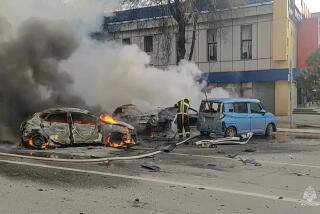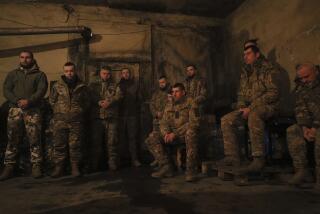Airstrikes Alone Are Worse Than Nothing
- Share via
I’ll never forget the rush of feelings as I reached a downtown intersection on my first day in Sarajevo and saw a spray-painted sign warning “Beware of snipers.” Looking toward the steep hills that rose from the valley like bleachers from a football field, I saw that the topography made the contest between the Serb snipers and their prey even more unequal than I’d imagined. As I considered how to cross the open area, I felt vulnerability, then outrage. How dare these cowards shoot at us from their protected perches?
Empathy for the Sarajevans who had been at the mercies of these bullies for 3 1/2 years called up a comforting fantasy: Like many Americans, in the back of my mind I had become convinced that U.S. planes could deal a powerful blow to right virtually any wrong. Today this exaggerated faith in air power has become a dangerous illusion.
News reports tell us that the U.S. has been losing patience with Serbia’s autocratic president, Slobodan Milosevic. A pending agreement may yet forestall military action. But eight months after Serbia launched a brutal search and destroy campaign against Albanian separatists in Kosovo, an accretion of gruesome pictures and detailed accounts of the murder of Albanian civilians by Serb security forces has pushed NATO to the brink of action. In the past few days, the television news has dutifully broadcast pictures of the state-of-the-art warplanes that Washington is prepared to hurl at Serbia if Milosevic doesn’t accede to an armed international presence in Kosovo--which NATO members, including the U.S., are reluctant to provide.
As citizens of the only remaining superpower, many Americans feel an obligation to “do something” to halt publicized atrocities--as long as doing so doesn’t put U.S. troops at significant risk. For the cautious global cop, airstrikes have become the weapon of choice. Yet as impressive as America’s radar-eluding and “smart” bomb laden aircraft may be, it’s unlikely that they alone could be effective in protecting civilians from ground troops. In the Gulf War, where the desert environment allowed air power to be used to maximum effect, U.S. dominance of the skies still couldn’t protect civilians on the ground. Even after the establishment of no-fly zones in the north and south of Iraq, Saddam Hussein was able to crush Kurdish and Shiite rebels under the noses of American planes.
Kosovo’s hilly, forested topography and dearth of military infrastructure make it much more unlikely that airstrikes will improve the lot of the suffering Albanians, who make up 90% of the province’s population. Airstrikes against Bosnian Serbs in August of 1995 did help break the Serbs’ stranglehold on Sarajevo--but only in combination with other propitious facts on the ground and the promise of 60,000 NATO ground troops to enforce a peace agreement. Another factor that made airstrikes successful in Bosnia was that the Serbs’ artillery were in relatively fixed positions. In Kosovo, by contrast, civilians are being killed by mobile artillery and machine guns wielded by Serbian ground troops. If the Serbs took care to minimize their exposure while moving around, they would be largely immune to airstrikes.
Even if airstrikes are not effective, some could argue, as a gesture of determination they would be better than nothing. This a dubious assumption that could backfire tragically. Even if airstrikes represented a mere pinprick in military terms, they would constitute an act of war that would feed Serbia’s cult of victimhood and tip the political balance even further toward hard-line nationalists. And Kosovo’s Albanian leadership has been emboldened to press its demand for independence for the province, which Serbia would never allow and NATO does not want.
Heart-wrenching as the news from Kosovo has been, we must part with the illusion that we can do something to help by simply lofting a few expensive planes and missiles. For the sake of all those in Kosovo and the rest of Serbia who would suffer the backlash from our futile gesture, we must resolve to do much more than strikes or swallow the frustration of doing nothing at all.
More to Read
Sign up for Essential California
The most important California stories and recommendations in your inbox every morning.
You may occasionally receive promotional content from the Los Angeles Times.













